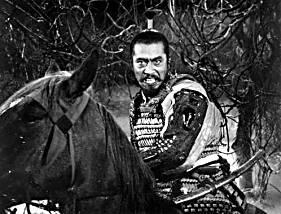Tuesday, October 4
Touch the Sound; the new Balboa calendar
 I went to go see Thomas Riedelsheimer's Touch the Sound at the Balboa the other night, and was very much impressed. It's very much a worthy follow-up to his sublime Rivers and Tides, the surprise hit doc of 2002, at least here in Frisco (no, I don't think Bowling For Columbine counts as a surprise.) The two films share a number of similarities, not the least that they both serve as a record of the transitory art actualized by a singular creator, in the case of Rivers and Tides sculptor Andy Goldsworthy, and in this case percussionist Evelyn Glennie. Though Goldsworthy and Glennie work not only in different media but ostensibly in completely different sensory realms, they seem to be kindred spirits, at least when viewed through Riedelsheimer's lens. In Rivers and Tides he emphasized Goldsworthy's tactile understanding of his materials- the sticks, rock, leaves, and bits of earth he perhaps instinctively sculpted in concert with the rhythms of nature. In Touch the Sound he demonstrates how Glennie's approach to music comes out of her harnessing of the sense we normally separate from hearing and call touch (as explained in the film and more thoroughly on her website, Glennie is profoundly, though not totally, deaf.)
I went to go see Thomas Riedelsheimer's Touch the Sound at the Balboa the other night, and was very much impressed. It's very much a worthy follow-up to his sublime Rivers and Tides, the surprise hit doc of 2002, at least here in Frisco (no, I don't think Bowling For Columbine counts as a surprise.) The two films share a number of similarities, not the least that they both serve as a record of the transitory art actualized by a singular creator, in the case of Rivers and Tides sculptor Andy Goldsworthy, and in this case percussionist Evelyn Glennie. Though Goldsworthy and Glennie work not only in different media but ostensibly in completely different sensory realms, they seem to be kindred spirits, at least when viewed through Riedelsheimer's lens. In Rivers and Tides he emphasized Goldsworthy's tactile understanding of his materials- the sticks, rock, leaves, and bits of earth he perhaps instinctively sculpted in concert with the rhythms of nature. In Touch the Sound he demonstrates how Glennie's approach to music comes out of her harnessing of the sense we normally separate from hearing and call touch (as explained in the film and more thoroughly on her website, Glennie is profoundly, though not totally, deaf.)Unfortunately, Touch the Sound has not been nearly the smash that Rivers and Tides was. There were no more than a few dozen in the audience when I went, and it has not been held over this week. As I left the theatre, I saw Gary Meyer in the lobby, and he told me that for whatever reason it's been the Balboa's worst draw all year. I wonder why; is it simply because people tend to think of visual art as more cinematic and appealing on film than music? Riedelsheimer's loving attention to the interplay between Touch the Sound's images and its carefully observant soundtrack would do a great deal to dispel that notion. To see for yourself, the film is still playing for a couple more days at the Rafael.
 Gary also had good news, though. The new Balboa calendar should be available around town later this week (it just became available online), and it has a lot of tantalizing stuff packed in it. He was even kind enough to let me take a quick peek at the proofs on their way to the printer, and I think I had to struggle to maintain the composure not to drool all over them. I'm quite intrigued to see Darwin's Nightmare when it opens October 14, and it's exciting to see that the latest Theo Angelopoulis film The Weeping Meadow is on its way to my neighborhood theatre in late October, but it's November, while more than 40 different pre-code (1930-1934) feature films play on double bills for three straight weeks, when I'll really be making my second home there. The kicker is that they're all films produced by Paramount, whose costume dramas and smooth-as-silk comedies filled with continental morality make it my favorite Hollywood studio of the early 1930's. The directors working there at the time included Ernst Lubitsch, Josef Von Sternberg, Rouben Mamoulian, Mitchell Leisen and Cecil B. DeMille, for starters. Among the stars under contract were Marlene Dietrich, Maurice Chevalier, Claudette Colbert, Mae West, Gary Cooper, Cary Grant, W.C. Fields, and the Marx Brothers. Oh, and of course Betty Boop; some of the greatest, most surreal cartoons ever made were the ones the Fleischer Brothers created and Paramount distributed during this period. Some sample programs booked: Duck Soup and W.C. Fields' Million Dollar Legs (and a Betty Boop cartoon) Nov. 6; a Lubitsch two-fer The Smiling Lieutenant (pictured) and Trouble in Paradise on Nov. 20; DeMille/Colbert team-ups Cleopatra and the Sign of the Cross on Nov. 19; Gary Cooper in a Farewell to Arms and the incredible Morocco on Nov. 23. You get the picture, though I'm tending to highlight the well-known quantities while I'm really just as excited to see unearthed rarities like the Faulkner adaptation the Story of Temple Drake (playing a special late show Nov 4). which features the now-underrated Miriam Hopkins and is simply unlikely to be seen any other place at all.
Gary also had good news, though. The new Balboa calendar should be available around town later this week (it just became available online), and it has a lot of tantalizing stuff packed in it. He was even kind enough to let me take a quick peek at the proofs on their way to the printer, and I think I had to struggle to maintain the composure not to drool all over them. I'm quite intrigued to see Darwin's Nightmare when it opens October 14, and it's exciting to see that the latest Theo Angelopoulis film The Weeping Meadow is on its way to my neighborhood theatre in late October, but it's November, while more than 40 different pre-code (1930-1934) feature films play on double bills for three straight weeks, when I'll really be making my second home there. The kicker is that they're all films produced by Paramount, whose costume dramas and smooth-as-silk comedies filled with continental morality make it my favorite Hollywood studio of the early 1930's. The directors working there at the time included Ernst Lubitsch, Josef Von Sternberg, Rouben Mamoulian, Mitchell Leisen and Cecil B. DeMille, for starters. Among the stars under contract were Marlene Dietrich, Maurice Chevalier, Claudette Colbert, Mae West, Gary Cooper, Cary Grant, W.C. Fields, and the Marx Brothers. Oh, and of course Betty Boop; some of the greatest, most surreal cartoons ever made were the ones the Fleischer Brothers created and Paramount distributed during this period. Some sample programs booked: Duck Soup and W.C. Fields' Million Dollar Legs (and a Betty Boop cartoon) Nov. 6; a Lubitsch two-fer The Smiling Lieutenant (pictured) and Trouble in Paradise on Nov. 20; DeMille/Colbert team-ups Cleopatra and the Sign of the Cross on Nov. 19; Gary Cooper in a Farewell to Arms and the incredible Morocco on Nov. 23. You get the picture, though I'm tending to highlight the well-known quantities while I'm really just as excited to see unearthed rarities like the Faulkner adaptation the Story of Temple Drake (playing a special late show Nov 4). which features the now-underrated Miriam Hopkins and is simply unlikely to be seen any other place at all. Very nearly as exciting to me as the "Sin in Soft Focus" pre-code series in November is a samurai film series running through most of December. It will include everything from seminal Akira Kurosawa / Toshiro Mifune films that I for one have yet to see on the big screen, such as Throne of Blood (Dec. 7-8, pictured) and Seven Samurai (Dec. 17-18) to 1960's Zatoichi films to the blood-drenched Sword of Doom (Dec. 19-20) to the ultimate critical Samurai film, Masaki Kobayashi's Harakiri (Dec. 2-6), which lays bare the corruption found at the core of samurai society the way an Anthony Mann film like The Far Country disassembles the myth of the heroic lone cowboy propagated by the Hollywood Western. (Why does it always feel so inevitable to compare samurai films with great Westerns?) While you anticipate the Balboa's jidai geki madness, this coming Saturday the Pacific Film Archive will hold a 1PM matinee of Kobayashi's period horror film Kwaidan.
Very nearly as exciting to me as the "Sin in Soft Focus" pre-code series in November is a samurai film series running through most of December. It will include everything from seminal Akira Kurosawa / Toshiro Mifune films that I for one have yet to see on the big screen, such as Throne of Blood (Dec. 7-8, pictured) and Seven Samurai (Dec. 17-18) to 1960's Zatoichi films to the blood-drenched Sword of Doom (Dec. 19-20) to the ultimate critical Samurai film, Masaki Kobayashi's Harakiri (Dec. 2-6), which lays bare the corruption found at the core of samurai society the way an Anthony Mann film like The Far Country disassembles the myth of the heroic lone cowboy propagated by the Hollywood Western. (Why does it always feel so inevitable to compare samurai films with great Westerns?) While you anticipate the Balboa's jidai geki madness, this coming Saturday the Pacific Film Archive will hold a 1PM matinee of Kobayashi's period horror film Kwaidan.
Comments:
<< Home
TOUCH THE SOUND the worst draw of the year? Dang, and I went twice, second time bringing a friend, but I guess that didn't help any.
Adam
Adam
Adam, I'm glad you were able to see Touch the Sound (twice!) before your trip to P/Busan. Speaking of which, I didn't mention that the new Balboa calendar also includes the President's Last Bang November 18-24. I noticed you mention it in your latest dispatch on Greencine Daily. Have you seen it yet? What do you think?
Brian,
I haven't seen it yet and skipped it at PIFF because I was hoping it'd get a release here and thanks so much for letting me know that it will. What I know is it's gotten a lot of great buzz from people whom I'll often share opinions with. Too bad we can't see the Im Sang-soo's intended version w/ the documentary footage at the end the SK ratings board forced him to take out. Perhaps the Balboa can do a little guerilla filmmaking, find that doc footage, and superimpose it over the credits at the end of the screening?
Adam
Post a Comment
I haven't seen it yet and skipped it at PIFF because I was hoping it'd get a release here and thanks so much for letting me know that it will. What I know is it's gotten a lot of great buzz from people whom I'll often share opinions with. Too bad we can't see the Im Sang-soo's intended version w/ the documentary footage at the end the SK ratings board forced him to take out. Perhaps the Balboa can do a little guerilla filmmaking, find that doc footage, and superimpose it over the credits at the end of the screening?
Adam
<< Home

